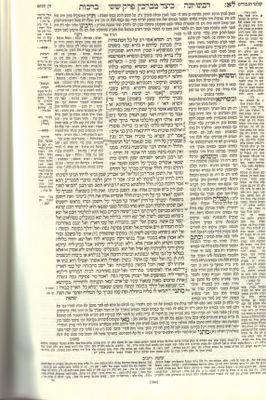
HIDE/SHOW IMAGE
31b
{Brachot 43a}
Rav Chisda cited Rav: Over all incense-perfumes we bless upon them Borei Atzei Bhesamim {who creates fragrant woods}, except for musk, for it is a type of {our gemara: from it is from a [myn/mn]} linking creature, that we bless upon it Borei Minei Bhesamim {who creates various kinds of spices}.
Balsam-oil, we bless on it Borei Shemen Areiv{Who creates pleasant oil}.
Over costum and oil in which it is steeped, and oil in which is has been ground, we bless on all of them Borei Atzei Bhesamim.
{Brachot 43b}
And jasmine {pr perhaps elder-tree} and sea rush we bless upon it Borei Atzei Bhesamim.
And garden narcissus we bless upon it Borei Atzei Bhesamim. Upon wild narcissus, we bless Borei Isvei Bhesamim. {who createst fragrant herbs}
Rav Sheshet said: These violets, one blesses upon them Isvei Besamim.
Mat Zutra said: One who smells a citron or a quince says: Baruch Shenatan Reiach Tov BeFerot {Blessed be He who placed a good smell in fruits}.
Mar Yehuda said: One who goes out {?abroad} in the days of Nissan and sees trees sprouting, says "Blessed be he who did not leave anything lacking in his world, and has created in it goodly creatures and goodly trees for the enjoyment of mankind."
Rav Zutra bar Tuvia cited Rav: How do we know that we bless on a good {sweet} smell? For it is stated in Tehillim 150:6 {the last pasuk in Tehillim}:
| ו כֹּל הַנְּשָׁמָה, תְּהַלֵּל יָהּ: הַלְלוּ-יָהּ. | 6 Let every thing that hath breath praise the LORD. {S} Hallelujah. {P} |
The Sages learnt {in a brayta}: If they brought before him {perfumed} oil and myrtle {hadas}: Bet Shammai say: He blesses on the oil and thus exempts the myrtle. And Bet Hillel say: He blesses on the myrtle and thus exempts the oil. Rabban Gamliel said: I will turn the scale {in favor of Bet Shammai}. For oil, we have the benefit of its scent, and we have the benefit of its annointing; for myrtle, we have the benefit of its scent and have not the benefit of its annointing.
Rabbi Yochanan said: The halacha are like the words of the one who tipped the scale.
Rava said: The halacha is like Bet Hillel.
And the halacha is like Rava, for he is later {than Rabbi Yochanan}.
The Sages learnt {in a brayta}: If they brought before him {perfumed} oil and wine: Bet Shammai say: He grabs the oil in his right hand and the wine in his left hand, and he blesses on the oil and afterwards on the wine. And Bet Hillel say: He grabs the wine in his right hand and the oil in his left hand, and blesses on the wine, and afterwards blesses on the oil. {Before going out} he smears it in the head of the attendant; if the attendant is a scholar {talmid chacham} he smears it on the wall, for it is unbecoming for a scholar to go out perfumed to the market.
The Sages learnt {in a brayta}: Six things are unbecoming for a scholar: He should not go out scented to the market; he should not go out by night alone; he should not go out in patched sandals; he should not converse with a woman in the market; he should not sit{our gemara: recline - [ysb/yshb]} in the company of ignorant persons; and he should not be the last to enter the study hall {Bet HaMidrash}. Some say that he should not take long strides nor carry himself stiffly.
"He should not go out scented...": This is in a place that they are suspect in homosexuality.
{The above is the version in the gemara. The Rif has the word oto which changes it to: They suspect him in homosexuality. This would be very strange, and the Bach emends the Rif to conform with what we have in our gemaras.}
And they only said this as regards his clothes {being scented} but upon his body, it is removing the {odor of} perspiration.
"he should not go out by night alone": Because of suspicion {of immoral practices}. And they only said this in the case where he did not establish an appointment, but if he established an appointment, they know that he is going to his appointment.
"he should not go out in patched sandals": They only said this in a case where it is a patch upon another patch, and on the upper part {of the sandal}, and in the summer, but on the sole, or in the rainy season, we have no issue with this.
{the Rif is omitting: and on the public road as opposed to the house, perhaps because it is obvious from the words "going out."}
"he should not converse with a woman in the market": And even if she is his wife, and even if she is his daughter or his sister, for not everyone is an expert on who his relatives are.
"he should not sit in the company of ignorant people": lest he come to be pulled after them.
"and he should not enter last into the study hall": lest they suspect him of being a sinner {=idler}.
"he should not take long strides": For Mar said: long strides diminish a man's eyesight by 1/500. What is the fix? Let him drink the kiddush wine of Shabbat night. {literally - Bein HaShmashot}
"nor carry himself stiffly": For it is stated in Yeshaya 6:3:
{Brachot 44a}
MISHNAH.
IF SALTED FOOD IS SET BEFORE HIM AND BREAD WITH IT, HE SAYS A BLESSING OVER THE SALTED FOOD AND THIS SERVES FOR THE BREAD



No comments:
Post a Comment